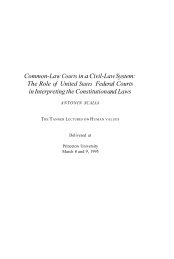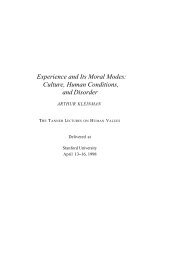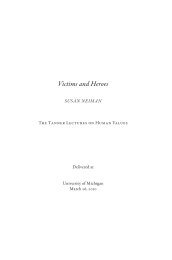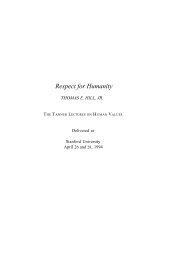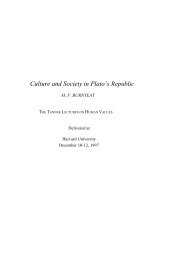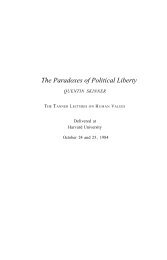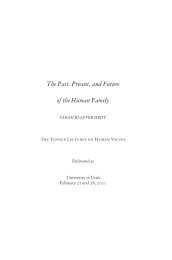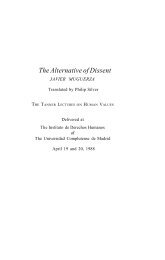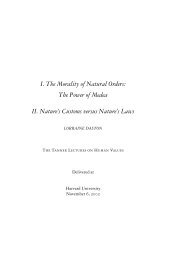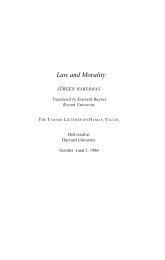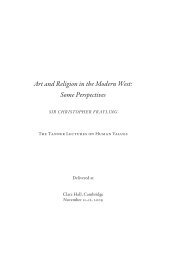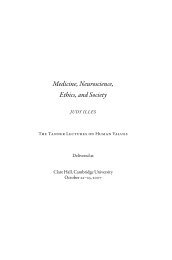Slote, Michael - The Tanner Lectures on Human Values
Slote, Michael - The Tanner Lectures on Human Values
Slote, Michael - The Tanner Lectures on Human Values
Create successful ePaper yourself
Turn your PDF publications into a flip-book with our unique Google optimized e-Paper software.
64 <str<strong>on</strong>g>The</str<strong>on</strong>g> <str<strong>on</strong>g>Tanner</str<strong>on</strong>g> <str<strong>on</strong>g>Lectures</str<strong>on</strong>g> <strong>on</strong> <strong>Human</strong> <strong>Values</strong><br />
of satisficing involved is not (merely) the kind familiar in the<br />
ec<strong>on</strong>omics literature where an individual seeks something other<br />
than optimum results, but a kind of satisficing that actually rejects<br />
the available better for the available good enough. Although the<br />
individual with the wish would be better off if he wished for<br />
more, he asks for less (we may suppose that if the wish grantor<br />
prods him by asking “Are you sure you wouldn’t like more m<strong>on</strong>ey<br />
than that?” he sticks with his original request). And if we have<br />
any sympathy with the idea of moderati<strong>on</strong>, of modesty, in <strong>on</strong>e’s<br />
desires, we shall have to grant that the satisficing individual who<br />
wishes, e.g., for less m<strong>on</strong>ey is not irrati<strong>on</strong>al. Perhaps we ourselves<br />
would not be so easily satisfied in his circumstances, but that<br />
needn’t make us think him irrati<strong>on</strong>al for being moderate in a way,<br />
or to a degree, that we are not. 5<br />
But at this point some doubt may remain about our descripti<strong>on</strong><br />
of the moderate individual’s resp<strong>on</strong>se to being granted a<br />
wish. It is not obvious that an individual who wishes for less than<br />
the most m<strong>on</strong>ey (or comfort or well-being) he could ask for is<br />
satisficing in the str<strong>on</strong>g sense defended earlier. He may make the<br />
seemingly modest wish he does because he is afraid of offending<br />
the wish grantor or in order to avoid being corrupted (or rendered<br />
blasé) by having too much wealth, and thus motivated, he will<br />
not exemplify the sort of satisficing moderati<strong>on</strong> whose n<strong>on</strong>irrati<strong>on</strong>ality<br />
I have tried to defend: he will be seeking what is best<br />
for himself under a refined c<strong>on</strong>cepti<strong>on</strong> of pers<strong>on</strong>al good that goes<br />
bey<strong>on</strong>d mere wealth or material comfort. 6<br />
With this I can absolutely agree. An individual who asks for<br />
less than she could may indeed be motivated by factors of the<br />
5<br />
In fact, it is hard to see how any specific m<strong>on</strong>etary wish can be optimizing<br />
if the individual is unsure about his own marginal utility curve for the use of<br />
m<strong>on</strong>ey. To that extent, we are neressnrily satisficers in situati<strong>on</strong>s where we can wish<br />
for whatever we want, unless, perhaps, we are allowed to wish for our own greatest<br />
future well-being in those very terms. If satisficing were irrati<strong>on</strong>al, would that mean<br />
that anything other than such an explicitly optimizing wish would be irrati<strong>on</strong>al?<br />
6<br />
Some of these points are made by Philip Pettit in reply to an earlier paper of<br />
mine, See his c<strong>on</strong>tributi<strong>on</strong> to the symposium “Satisficing C<strong>on</strong>sequentialism,” Proceedings<br />
of the Aristotelian Society (supplementary volume, 1984), p. 175.



